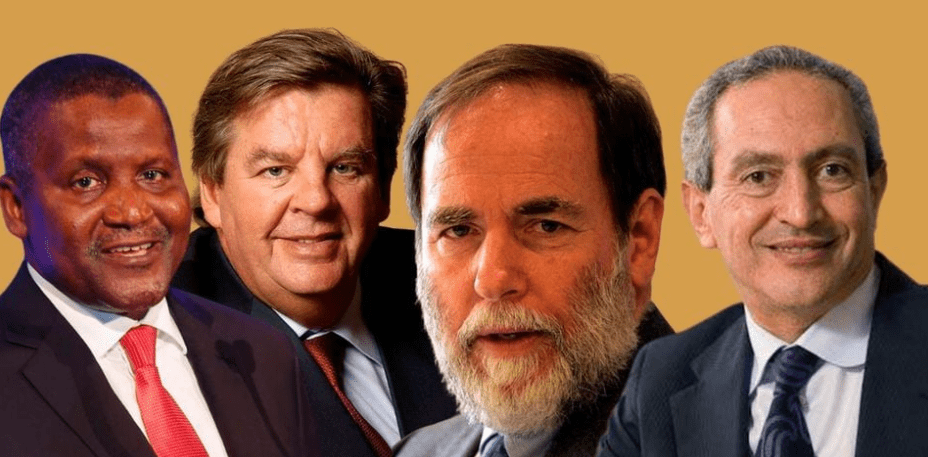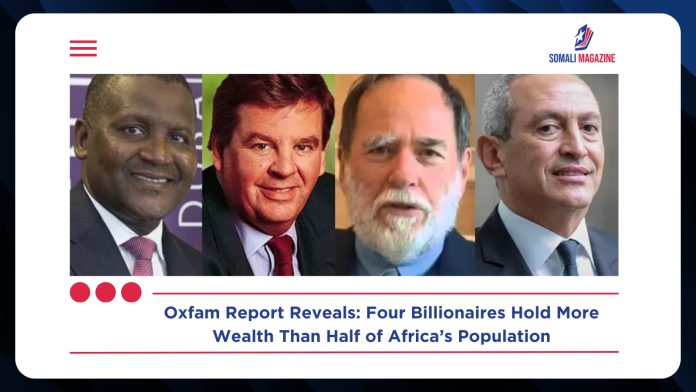Facebook Twitter (X) Instagram Somali Magazine - People's Magazine
Oxfam: 4 richest Africans own more than half of continent’s population’s wealth, a staggering revelation that has reignited global concern over Africa’s deepening inequality crisis. According to a new report released ahead of the African Union Mid-Year Coordination Meeting in Malabo, Equatorial Guinea, just four billionaires—Aliko Dangote, Johann Rupert, Nicky Oppenheimer, and Nassef Sawiris—now control $57.4 billion in wealth, surpassing the combined wealth of 750 million people, or half of Africa’s population.
The report, titled Africa’s Inequality Crisis and the Rise of the Super-Rich, paints a grim picture of wealth concentration on the continent. Since 2000, Africa has gone from having zero billionaires to 23, whose collective fortunes have surged by 56% in just five years, reaching $112.6 billion. Meanwhile, nearly 850 million Africans are experiencing hunger, and seven out of ten people living in extreme poverty globally are now in Africa.
Oxfam’s Africa Director, Fati N’Zi-Hassane, did not mince words. “Africa’s wealth is not missing. It’s being siphoned off by a rigged system that allows a small elite to amass vast fortunes while denying hundreds of millions even the most basic services,” she said. “This is an utter policy failure—unjust, avoidable and entirely reversible”.
The report highlights that the richest 5% of Africans hold nearly $4 trillion in wealth—more than double the combined wealth of the remaining 95%. Even if the top five billionaires lost 99.9999% of their wealth, they would still be 56 times richer than the average African.

Oxfam also points to the continent’s tax systems as a major contributor to inequality. Africa collects just 0.3% of its GDP in wealth taxes—less than any other region globally and far below the OECD average of 1.8%. Over the past decade, that already meagre share has dropped by nearly 25%, while indirect taxes like VAT continue to disproportionately burden the poor.
The consequences are stark. Half of Africa’s population lives in 19 countries where income inequality has worsened or stagnated over the past decade. Gender inequality is also pronounced, with men owning three times more wealth than women—the widest gender wealth gap of any region in the world.
Oxfam proposes a modest 1% wealth tax and a 10% income tax on the richest 1%, which could raise $66 billion annually—enough to fund free quality education and universal electricity access across the continent.
Some countries are already showing that fairer economies are possible. Morocco and South Africa collect over 1% of GDP from property taxes, while Seychelles has seen the income share of its poorest 50% grow by 76% since 2000.
As African leaders gather in Malabo, Oxfam is urging them to confront inequality head-on. “Taxing the super-rich isn’t just fair—it’s essential for building the Africa we want,” N’Zi-Hassane added.
The report serves as a wake-up call for policymakers, civil society, and international partners. Without urgent reforms, the continent risks entrenching poverty and undermining democratic progress. The wealth gap is no longer just an economic issue—it’s a moral crisis demanding bold action.

